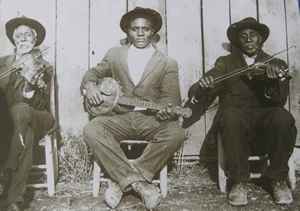Music

From Emancipation to the end of the World War II, African American performers and composers profoundly impacted the music of the world in the genres of gospel, blues, and jazz.
The Fisk Jubilee Singers began touring in 1871 as a way for the nascent Fisk University to raise needed funds to continue its ambitious programs of educating the freed people of the South. They toured the northeast and abroad, where they were met with an enthusiastic response, especially to their encore of spirituals, then called “slave songs,” whose themes of hope, grace, and ultimate redemption were sung in a joyful, rhythmic, and animated performance. In addition, the Jubilee Singers’ undeniable mastery of the classical music canon struck at stereotypes held by most whites in America and England. Their dignified bearing and the unquestioned talent of the students emphasized the potential and worth of African-American education.
At the turn of the century, urban-based African-American sacred music was grounded in music forms and performance styles nurtured in Pentecostal and Holiness churches, with the mostly white Church of God (headquartered in Cleveland, Tennessee), the Church of Nazarene (with its Trevecca college located in Nashville) and the mostly African-American Church of God in Christ (based in Memphis), being the most important. The significant black gospel harmony quartet known as The Spirit of Memphis was associated with the Church of God in Christ.
Tennessee also produced popular black gospel performers and composers. Memphis’ Willie Mae Ford Smith and the Ford Sisters delighted crowds at the National Baptist Convention in 1924. The Reverend Cleavant Derricks of Chattanooga, the Reverend Herbert W. Brewster of Memphis, and Lucie Campbell, also of Memphis were significant composers. Derricks, who wrote over 300 songs, studied at the Cadek Conservatory of Music in Knoxville, Tennessee A & I, and the American Baptist Theological Seminary in Nashville. Brewster had million-selling records by Mahalia Jackson and the Ward Singers in the 1940s, and Campbell published the first of her more than one hundred songs in 1919.
From 1925 to 1935, Delta blues singers from West Tennessee gained fame as recordings made in Memphis found national audiences through radio. Popular performers included the Memphis Jug Band, Cannon's Jug Stompers, Furry Lewis, Frank Stokes, Memphis Minnie (Lizzie Douglas), Sleepy John Estes, and Sonny Boy Williamson.
Tennessee’s blues music traditions are closely linked to two giants: composer and bandleader W. C. Handy (1873-1958) who was active in Memphis and singer Bessie Smith (1894-1937) of Chattanooga. Handy’s signature songs “Memphis Blues” (1912) and “St. Louis Blues” (1914) are classics; Smith’s vocal stylings have influenced generations of blues, jazz, rhythm & blues, and rock singers.
Related Content
Blue Yodel #9 (Standin' on the Corner) by Jimmie Rodgers, with Louis Armstrong and Lil Hardin Armstrong. Full Item Record.
Go Down Moses, sung by Fisk Jubilee Quartet singer Roland Hayes, arranged by H.T. Burleigh. Full Item Record.
Jim Crow Train, performed by Josh White in 1941. Full item record.
Clip of My Soul is a Witness, performed by the Fisk University Jubilee Quartet in 1911. Full Item Record.
Clip of Symphony No.9 in E Minor B. 178 (Op 95) -- Largo "New World Symphony" by Antonin Dvorak. H.T. Burleigh worked as a copyist for Dvorak and introduced him to African American spirituals. Full Item Record.